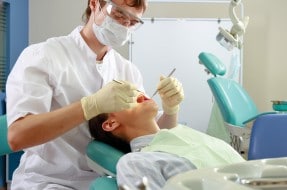Call now on0800 051 8069
Planning on going to the dentist post-lockdown? Here’s what you need to know about in the new normal of COVID-19
-
Guidance on attending the dentist for the first time since lockdown.
If you are planning on going to the dentist for the first time since lockdown, here are a few things to be aware of in the new normal of COVID-19….
When will dental practices re-open?
NHS England’s chief dental officer, Sara Hurley, said: “We are asking that all dental practices commence opening from Monday, June 8 for all face-to-face care, where practices assess that they have the necessary IPC and PPE requirements in place.”
Many practices have now reopened but have had to adapt in order to provide their services safely. Please be aware that, as a result of the period of closure, thousands of patients have had appointments cancelled or postponed and therefore your dental practice may have a backlog which they need to deal with on a priority basis.
Is it safe to attend the dentist?
Research reveals that nearly one third of British people are reluctant to attend the dentist post-lockdown. Dentistry is classified as being high-risk for transmission of COVID-19, and therefore careful consideration has been given as to how best to protect patients and dentists whilst providing treatment.
Dentists are trying to reassure people that they have taken the necessary precautions and they will provide a safe and sterile environment for treatment.
Before you visit the dentist
Prior to attending, perhaps when booking your appointment, your dental practice may ask you whether you feel well, and will ask you few questions about your health and the health of the people who you live with.
If you have any symptoms of coronavirus then you are unlikely to be permitted to attend the surgery. Appointments should be made over the telephone, and some dental practices have even locked their doors to prevent people entering the surgery unexpectedly.
When you attend for your appointment
You should aim to arrive on time for your appointment. If you arrive too early then this will increase your time at the practice and any potential exposure to COVID-19. However, if you arrive too late then the dentist may not have time to complete the treatment.
Please note that some dental practices are now requiring additional time to sanitise between patients, and therefore appointment times are more staggered. Some practices are also asking you to wait in your car and then will collect you when it is time for your appointment, rather than coming into the reception area.
Your temperature may be taken on arrival by a member of staff to check for a fever. If you have a fever then you may not be able to continue with your appointment, and this may need to be rescheduled.
When entering the practice you will be asked to sanitise your hands, either using the sanitiser provided by the practice or your own, and there may be a protective screen at reception. The reception area may also be reorganised to allow for social distancing and some items which cannot easily be sanitised may have been removed. Some practices will also ask you to place your belongings within a clean bag to prevent any cross contamination.
Personal Protective equipment (PPE)
Personal protective equipment (PPE) has always been worn by dentists, however, as result of the increased global demand for PPE the cost to dental practices has increased significantly. Additionally, new guidelines from the Government mean that dentists now have to wear more enhanced PPE to minimise the risk of cross contamination during certain treatments. For many dental practices this has resulted in having to increase their fees or apply a ‘safety tariff’ to their charges.
The British Dental Association noted that at one point during the Covid 19 outbreak, out of 2000 dental practises surveyed, only a third of practices had enough PPE to provide face-to-face care and they called for urgent action from the government.
If you attend the dentist post-lockdown, you should expect to see your dentist wearing full PPE (such as a surgical mask, visor and a gown) and they will most likely also ask you to also wear a face mask until they are ready to commence the examination or treatment.
Aerosol Generating Procedures
There has also been concern regarding the use of aerosol generating procedures in dentistry, as they could lead to airborne contamination.
For many dental practices the first line of defence has been to minimise the use of aerosol generating procedures where possible. Where these procedures are necessary though, they should be carried out in a separate room and the practice must ensure a high standard of cleaning following the procedure to prevent cross contamination.
For some people this may mean that, if the required treatment involves an aerosol generating procedure but your dental treatment is not urgent, their appointment may be postponed.
When you leave
It is safer if you can pay using a contactless card or, if you do have to enter your pin, the dentist may place a protective removable film over the chip and pin machine.
If you are required to sign any paperwork you should try to use your own pen. Although many practices are now sending out treatment plans, leaflets with advice, and receipts via email.
If you are in any doubt, please call your dental practice and they can advise you on the specific changes they have made.







